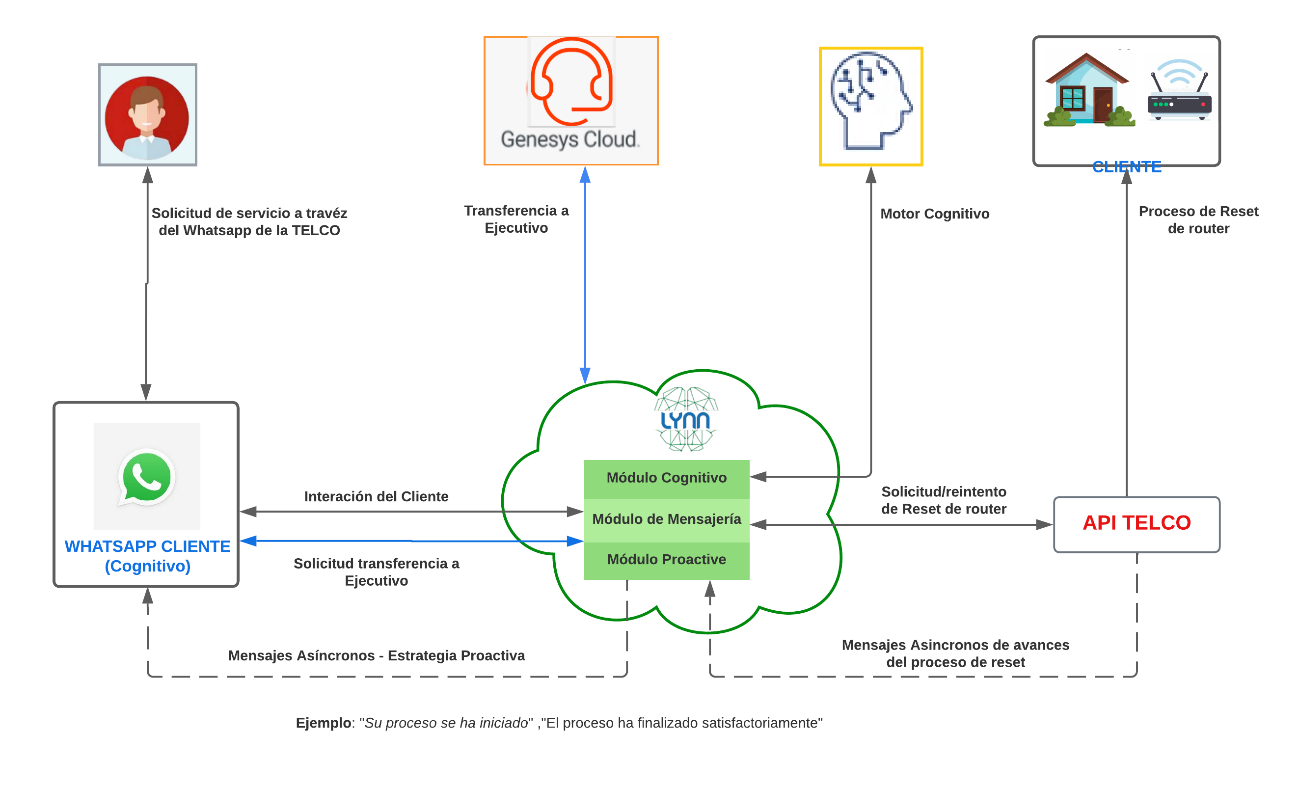Channel – WhatsApp – Proactive Messages in Asynchronous Communication with Retry Option or Agent Deflection – Cognitive Module.

"Our customers reach out to us via WhatsApp, and an automated flow in Lynn welcomes them, initializing an inquiry 'Please tell us how we can assist you'. At this point, the user can freely describe their need or request. Each typed phrase is assessed by the cognitive module to find the best-suited intention for their query. For instance, if our customer inquires: 'Update my router', the corresponding intention is detected, and immediately, a menu is shown giving the customer the option to remotely update and restart their router by invoking a Telco API. Throughout the process, each update step is automatically communicated to the customer proactively, allowing the customer to continue consuming self-service while the task is executed. In case of a failure reported by the update process, a menu is displayed prompting the opportunity to retry, contact an operator, or cancel. If affirmative, this communication is transferred to an operator in Genesys Cloud to assist the customer."
Status: Active.
Complexity: Advanced.
Category: Chat Bot / Voice Bot
Use Case Description
-
Usability: Fulfill the need to inform a WhatsApp-connected client in a cognitive self-service context about the status of a remote process happening in parallel to their ongoing conversation. In the event of a failure, the option to manage retries or divert to an executive is provided. Note: Not recommended if there is deflection in the primary self-service flow.
-
Expected Outcome: The WhatsApp-connected customer receives asynchronous messages regarding the status of a remote process, without limiting their ability to consume the primary self-service flow, offering the chance to retry the remote process execution or contact an agent.
Resolution Method for Use Case
Solution Description
-
Before contracting and connecting the WhatsApp channel via Lynn's provider offering, a cognitive self-service flow is structured in Lynn's designer. It's capable of executing an external API using the 'JSON WebRequest' action, initiating an external process capable of notifying Lynn about its execution state via API and proactive outbound module. A campaign manages messages in parallel, enabling the customer to continue using automation services in Lynn's primary flow.
-
Upon detecting the target external process intention in any of the customer's typed phrases, a menu requesting confirmation for this activity is displayed, followed by its execution.
-
A proactive flow is added that will display a menu in case of a failure reported by the external process, with options for retrying, canceling, or transferring to an executive. This is implemented via Lynn's 'Derivation to Call Center' action, diverting the conversation to the chat engine.
LYNN Components Involved
- WhatsApp Connector.
- Chat Connector.
- Lynn Proactive Module.
- Cognitive Module (Can be associated with Lynn's NLU).
- Messaging API – Proactive.
- Channels Sandbox (for testing).
- Chat Engine (if choosing LMC).
External Components Involved
- Chat Engine.
- External API (External service managing a remote process and notifying Lynn of new state updates).
- WhatsApp Account.
- Cognitive Engine (not applicable if using NLU Lynn).
Estimated Hours: 56 hours, referenced if executed by a Certified Lynn Core Developer (LCCD) personnel. Note: Only the cognitive association of the intention corresponding to the external process action is considered. For example, there must be a minimum training of the cognitive engine for the 'router restart' intention.